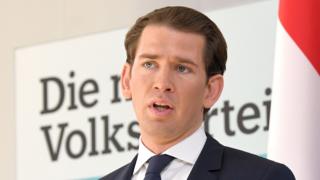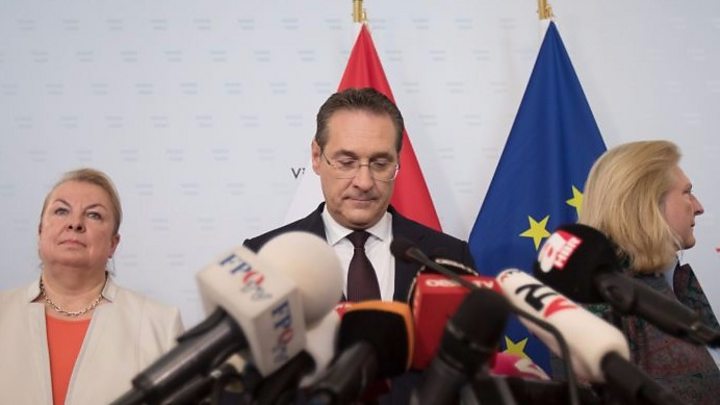Austrian government in turmoil over video scandal
Austrian Chancellor Sebastian Kurz is battling to shore up his coalition government after a video scandal forced the resignation of his far-right deputy Heinz-Christian Strache.
Attention is now focused on Interior Minister Herbert Kickl, a member of Mr Strache’s Freedom Party (FPÖ).
In a brief press statement, Mr Kurz did not confirm speculation that Mr Kickl would be sacked over the affair.
Undercover video showed Mr Strache discussing a deal with a Russian woman.
The scandal erupted on Friday, when the footage from 2017 was published in German media. The next day Mr Strache resigned and Chancellor Kurz – head of the centre-right People’s Party (ÖVP) – said new elections would have to be held.
The video showed Mr Strache and another FPÖ official proposing to offer government contracts to a supposed Russian oligarch’s daughter. They also suggested taking over Austria’s best-selling newspaper, Kronen Zeitung, to turn it into a party propaganda organ.
Russia has denied any involvement. President Vladimir Putin’s spokesman, Dmitry Peskov, said “this is an incident that has not, and could not, have anything to do with us”.
The scandal comes at a particularly awkward time for the FPÖ. Voters across the EU go to the polls on 23-26 May, in European Parliament elections widely expected to boost the numbers of far-right MEPs.
Political uncertainty
Mr Strache blamed his actions on alcohol and acting like a “teenager”, saying his behaviour had been “stupid” and “irresponsible”, and that he was leaving to avoid further damage to the government.
Mr Kurz is due to meet Interior Minister Kickl soon – but the FPÖ has warned that, if Mr Kickl is forced out, the rest of the FPÖ ministers will quit.
Mr Kickl said “today I have another meeting with Chancellor Kurz, and I will once again make it clear to him that what matters to me is the whole of Austria, the whole of my people, not my position”.
Austrian President Alexander van der Bellen called for early elections to be held in September.
Chancellor Kurz said his party was “shocked” by Mr Strache’s behaviour, which he called “a wrong approach to politics”.
The scandal had damaged Austria’s international reputation, Mr Kurz said.
He demanded a full investigation, saying the video might have criminal ramifications. “Anything illegal must be clarified,” he said.
EU ‘in disbelief’
An EU Commission spokesman, Margaritis Schinas, said the EU had “followed in disbelief as a leader of a political party was seen negotiating access to media and institutions, in exchange for funds from external benefactors who clearly do not have Europeans’ best interests at heart”.
On Saturday Mr Kurz said this was not the first time he had had difficulties with the FPÖ.
“Even if I didn’t express myself publicly at the time, there were many situations that I found difficult to swallow,” he said. “After yesterday’s video, I must say quite honestly: Enough is enough.”
What do we know about the video?
It is not known who recorded it.
Neither is it clear who set up the meeting, which allegedly took place at a villa on the Spanish island of Ibiza in July 2017 – before the FPÖ joined the new government.
The video shows Mr Strache and Johann Gudenus – another FPÖ politician – relaxing on sofas, drinking and talking to a woman who claims to be a wealthy Russian national looking to invest in Austria.
In the footage, the woman offers to buy a 50% stake in Austria’s Kronen Zeitung newspaper and switch its editorial position to support the Freedom Party.
In exchange, Mr Strache said he could award her public contracts, explaining that he wanted to “build a media landscape like [Victor] Orban”, a reference to Hungary’s prime minister, described by critics as an authoritarian leader.
The vice-chancellor also speculates that the Russian’s takeover of Kronen Zeitung could boost support for the party to as much as 34%.
“If you take over the Kronen Zeitung three weeks before the election and get us into first place, then we can talk about everything,” Mr Strache said.
As part of the deal, he suggests the Russian woman “set up a company like Strabag”, the Austrian construction firm.
“All the government orders that Strabag gets now, [you] would get,” he continues.
Mr Strache also names several journalists who would have to be “pushed” from the newspaper, and five other “new people whom we will build up”.
Source: Read Full Article




